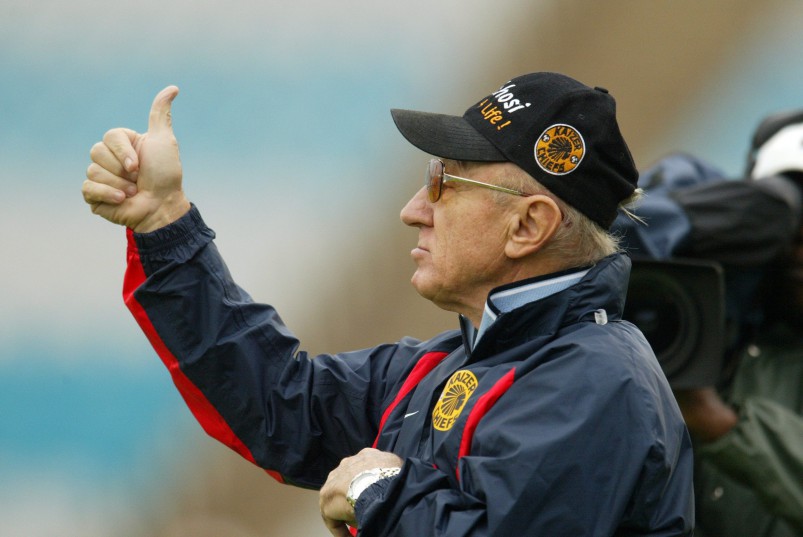features 28.5.2016 11:00 am
Ted Dumitru: Africa’s adopted son

JOHANNESBURG, SOUTH AFRICA - 6 March 2004, Ted Dumitru shows thumps up to his players during the PSL match between Kaizer Chiefs and Black Leopards at FNB Stadium in Johannesburg, South Africa. Photo Credit : © Duif du Toit Gallo Images
Often controversial and stubborn in his beliefs, Dumitru was categorised as one of the two South Africa-based ‘professors of soccer’.
It was Zambian president Kenneth Kaunda who described Romanian-born Ted Dumitru as “more than a coach, but an adopted son of Africa and a humanist”. And echoing these sentiments about 76-year-old Theodore “Ted” Dumitru – a unanimously acclaimed South African soccer legend who died suddenly on Thursday at the Eastgate shopping centre in Johannesburg – was Kaizer Motaung, Kaizer Chiefs’ chair and founder.
“I first heard of Ted when I was playing in the US and he was coaching there in the mid-1970s,” said Motaung. “When he came to Africa to first coach in Zambia, we got together when he moved on to Swaziland. We met for the first time and laid the foundation for him to coach Chiefs on two separate occasions.
“His attributes were many, but what probably impressed me most was that, unlike many other coaches, he believed that South African players should adopt a refined South African approach to playing soccer – and not stifle the flair and natural talent for the game that exists here.
“This striving for the best of both worlds philosophy was what he advocated throughout his 30 or more years in the country.” Motaung said he was devastated by Dumitru’s death, “more so because it came without warning and while he was enthusiastically pursuing his love of soccer to the end – continuing to advocate his unwavering beliefs about the game”.
Often controversial and stubborn in his beliefs, Dumitru was categorised as one of the two South African-based “professors of soccer” – the other being Augusto Palacios, former Peruvian World Cup player and Bafana, Orlando Pirates, Kaizer Chiefs and Mamelodi Sundowns coach. “It’s as though I have lost a brother,” said Palacios.
“We often crossed swords on soccer matters. But I always respected his views as someone who lived for the game and knew what he was talking about.” With an outwardly aggressive and outspoken manner, Dumitru was, in contrast, something of an introvert in his private life and rarely spoke of his background, in spite of coaching in many parts of the world during 50 varied years in the business.
But when he opposed the Communist regime in Romania and sought asylum in Germany, he landed a 20- year sentence in the country of his birth for his political beliefs. Afterwards, before coming to Africa, he acquired US citizenship and spoke his mind wherever he went.
Among his numerous achievements and honours was coaching both Chiefs and Sundowns when the two glamour clubs won Premier League titles on two occasions. He also guided the Brazilians to the final of the prestige Caf Champions League. He coached Pirates and Bafana briefly with less success and afterwards held various coaching, technical and administrative positions with the SA Football Association (Safa), where his insight and knowledge of the sport earned him the reflected accolade of being a rose among the thorns.
Above all else, Dumitru lived for soccer and believed that in spite of his many theories, he remained to the death a student as much as a teacher. He was not afraid to criticise anyone, no matter what their status at Safa or at one of the various clubs at which he was employed.
But, occasionally, when backed into a corner, he was prone to retreat under the pressure. South African soccer is certainly poorer after the death of the “Professor”, but richer having been able to tap into his wealth of knowledge.
SOURCE: The Citizen